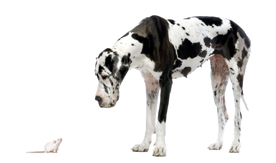
UMaine Bioengineering Students Collaborate With The Jackson Laboratory, IDEXX Laboratories on Capstone Projects
Three University of Maine student research teams in bioengineering are collaborating with The Jackson Laboratory in Bar Harbor and IDEXX Laboratories Inc., in Westbrook on senior capstone projects.
Working under the supervision of Professor David Neivandt, director of UMaine’s Graduate School of Biomedical Science and Engineering, and coordinator of the undergraduate bioengineering program, the bioengineering seniors are involved in semester-long capstone projects in which they develop device concepts and methods to improve biological systems that benefit society.
“In the early stages of our classes, we have a lot of canned problems,” says Jeff Servetas, Hancock, Maine, of his bioengineering coursework. Now as seniors, the students are developing solutions to open-ended questions that have not been addressed before.
Two teams are working with IDEXX — one team will work to develop a device veterinarians could use to test for ear mites in dogs, while the other team’s focus is to design a method to provide precise, accurate and rapid quantification of spot density in the IDEXX SNAP® test for screening for diseases.
“I really feel like I’m making a difference,” says Servetas of the project. “If the work I do relieves pet owner of the burden, we’re making a difference.”
Tony DiMarco, vice president for research and development at IDEXX, says working with UMaine students in co-ops and on capstone projects is enjoyable. “The students are fantastic — they jump headlong into projects and thrive on working through complex design problems, using a systematic approach that reveals their intense training. It allows us to get a head start on new projects, or explore some new areas that we might not otherwise work on,” he says.
A third bioengineering team was asked by Jackson Laboratory to develop a device to keep mice warm during embryo transplant surgery, thereby improving the success rates.
The next project in the course will send the students to Dirigo Pines in Orono, where they will be working with the residents and staff to identify problems that can be addressed with engineering solutions.
Majoring in bioengineering at UMaine means majoring in problem-solving, says Coady Richardson of Madison, Maine. “I’ve always liked puzzles and solving problems. (Bioengineering) is the most challenging program on campus,” says Richardson, adding that working with Jackson Lab mentors has taught him how to effectively communicate about research.
Having a well-rounded “toolbox” of problem-solving and communication skills with which to address bioengineering challenges is a true boon, according to the students.
“We learn to be professionals,” says Haylea Ledoux of Bedford, N.H. While communicating in different “engineering languages” is important, being able to learn in different styles has made the most difference, she says.
“It’s a big test for us to prove to ourselves that we have the knowledge and are capable of doing this,” says Ledoux.
Contact: Margaret Nagle, 207.581.3745
